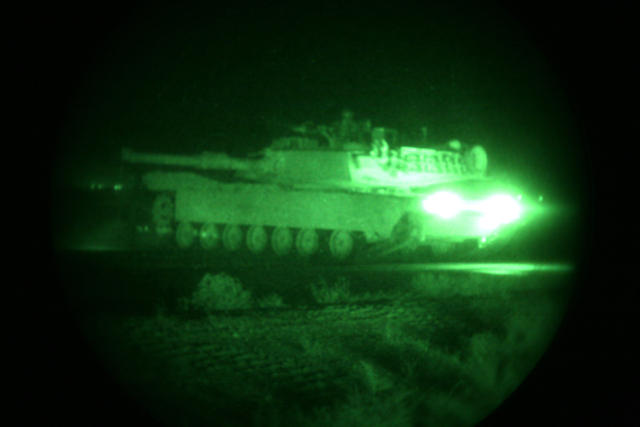
A U.S. M-1 tank on the prowl in Fallujah in June, 2007 / Marine photo by Joseph A. Lambach
The U.S. military invaded Iraq in 2003 without permission. But now that it no longer has approval from Baghdad’s post-Saddam government to stay beyond 2011, all U.S. forces will be pulling out by year’s end, President Obama said Friday. “After nearly nine years, America’s war in Iraq will be over,” Obama said at the White House. “Today I can say that our troops in Iraq will definitely be home for the holidays.”
The decision effectively ends a U.S.-initiated war — arguments have raged over that decision, both inside and outside the U.S. military and government, since President George W. Bush launched it — at a cost of nearly 4,500 U.S. troops’ lives and a trillion dollars. It began March 20, 2003, with what the Pentagon called a “shock and awe” aerial bombardment that succeeded in ousting Saddam Hussein in less than three weeks. But it was followed by more than three years of internal violence that the U.S. did little to prevent.
“Today is a historic day for the United States and for the people of Iraq,” said Paul Rieckhoff of the Iraq and Afghanistan Veterans of America. “And it’s an especially poignant time for the veteran community –many of us gave a large part of our lives, and some gave all.”
Obama’s announcement caps a remarkable string of recent foreign-policy successes for his Administration: in addition to a total pullout from Iraq (which could boomerang if the country reverts to civil war), he has overseen the killings of Osama bin Laden and U.S.-born Anwar al-Awlaki, along with playing a key role in the Libyan campaign that effectively ended Thursday with the death of Moammar Gaddafi.
The Pentagon had hoped to keep as many as 5,000 troops (down from the current 45,000) inside the country to train Iraqi forces, keep an eye on neighboring Iran, and generally act as a stabilizing force inside a volatile nation in the middle of a volatile region. The U.S. role in Iraq will now shift to a civilian one, and many challenges remain.
For the past year, Pentagon officials had been imploring the Iraqi government to request that U.S. forces stay into 2012. “We are willing to have a presence beyond that time,” then-defense secretary Robert Gates told troops during an April visit to Iraq. “So if folks here are going to want us to have a presence, we’re going to need to get on with it pretty quickly…the initiative ultimately has to come from the Iraqis.”
But Iraq made it clear it would not grant U.S. troops immunity from prosecution under Iraqi law, which made it politically impossible for Washington to leave troops there. Generally, status-of-forces pacts subject troops based in foreign lands to their homeland’s laws, not those of their hosts. By denying U.S. troops immunity, both sides knew the U.S. would have to pull out.
Baghdad’s refusal to give U.S. troops immunity let the Iraqis say “no thanks” silently.


